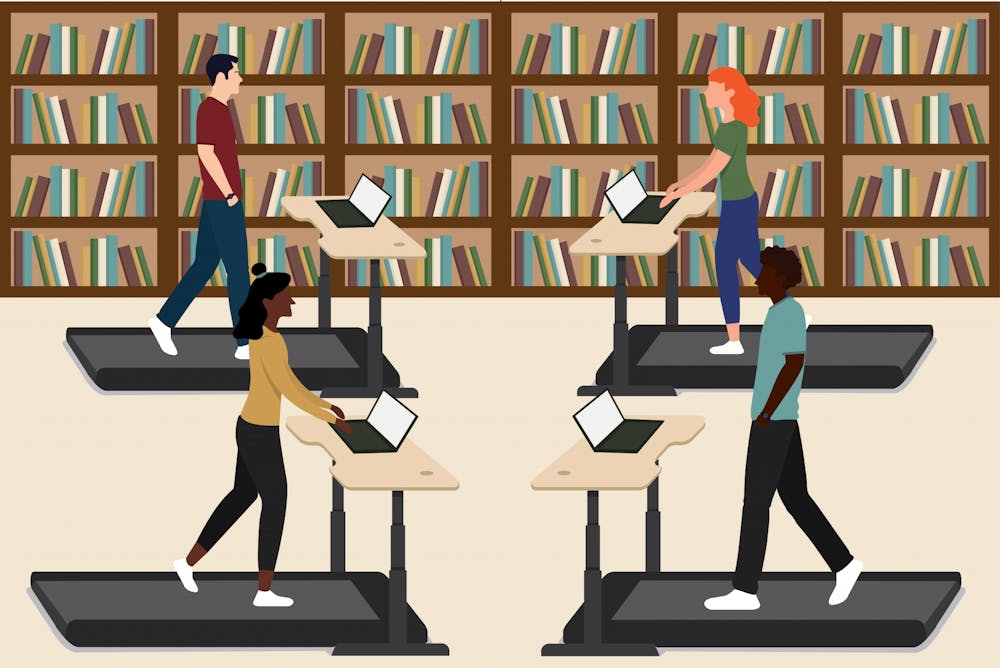Exercise equipment with attached desks should be installed in the Thomas Cooper Library so that students have the option to move while they learn.
Exercise desks are desks with a built-in exercise component, such as a treadmill or bicycle. Physical movement while studying has been proven to offer several cognitive benefits including improved memorization and focus.
According to a study published in the International Journal of Exercise Science, “simultaneous memorization and exercise produced a greater ability to recall words than memorization after or without exercise.” Considering the idea that hitting a daily step goal enhances the quality of learning, students will be eager to explore the advantages of physically engaged study techniques.
Danielle Wadsworth, an associate professor in the School of Kinesiology at Auburn University, has conducted extensive research on the intellectual benefits of pairing learning with exercise, which emphasizes the importance of taking physically active brain-breaks while studying.
“Being sedentary for long periods of time is not conducive, either physiologically or cognitively, and so to disrupt those with frequent physical activity breaks may enhance outcomes,” Wadsworth said.
Exercise desks would prevent sedentary behavior and facilitate brain breaks to improve cognitive function and information retention.
Students should have the resources available for them to study in the way that best suits their learning style. Some students have expressed the need for active learning because stationary studying is not optimal for everyone.
“If I’m just sitting at one desk all day for a long time I start to just become less motivated and procrastinate a lot more,” Group X Instructor and fourth-year public health student Molly Jones said.
The library is not currently suitable for active learners, but exercise desks would provide an outlet for students who might get restless while sitting for hours cramming for an exam or writing a paper.
USC Campus Recreation Fitness Manager and fourth-year global studies and anthropology student Jenna Gileczek said she brings textbooks to the Strom Thurmond Wellness and Fitness Center to study while using the exercise equipment.
“I’ve come in before and just propped my book up … and walked and read. We have staff that do that as well, and other students,” Gilecezek said.
Clearly, there’s a need that isn’t being met at our university. Luckily, the Dean of Libraries Thomas McNally has put extensive thought into the idea of implementing exercise desks in the Thomas Cooper Library. He even has a location in mind.
“I'd always pictured that we would put them up on the Mezzanine, the area that looks out over the fountain,” McNally said.
This spot of the library is ideal for exercise equipment because there’s an abundance of natural light and open space for easy breathing while maintaining social distancing.
Despite his enthusiasm, McNally said the library doesn’t have the resources to purchase and maintain the desks over an extended period of time.
To overcome this issue, he suggested a partnership with Campus Recreation. He doesn’t express as much concern for the initial funding to purchase the equipment, but this partnership provides a solution to the need for longer-term maintenance.
Jones also emphasized the need for proper maintenance of the exercise machines.
“You wouldn’t want someone to get hurt because maybe something is off about the bike or the treadmill. So, I think making sure that it’s working well would be important,” Jones said.
In a partnership with Campus Recreation, exercise desks in the library could be regularly serviced to ensure the safety of our students.
Both Jones and Gileczek said that this move would be in line with Campus Recreation's goals.
“A huge mission for Campus Rec is to just have a campus full of students and staff that are more physically active throughout their day,” Jones said.
In collaboration with Campus Recreation, students would have access to functional and safe machines in the library.
Director of Campus Recreation Mitch Nettesheim said the Campus Recreation maintenance team could train others to handle upkeep and fix damaged equipment.
One of the easiest ways to promote regular physical activity is to make it accessible and efficient. If students are presented with the opportunity to knock out their workout and their studies simultaneously, they might be more willing to incorporate physical activity into their daily lives.
A universal effort is required to fund, implement and maintain exercise desks in our libraries, but USC has an opportunity to offer students resources that fuse movement with learning.
This opportunity could inspire positive lifestyle change by encouraging regular physical activity and improving the efficacy of daily studies, and some students and staff have already expressed great interest in turning this plan into reality.
So, in the words of the USC Dean of Libraries, “Let’s get the ball rolling.”

